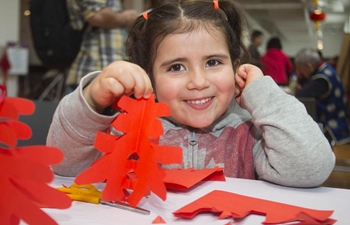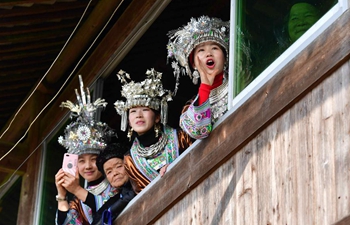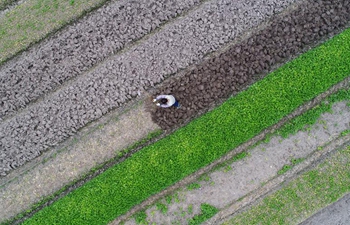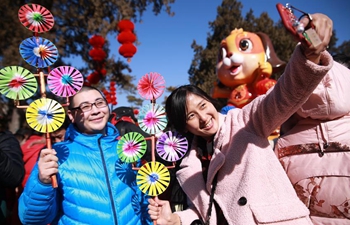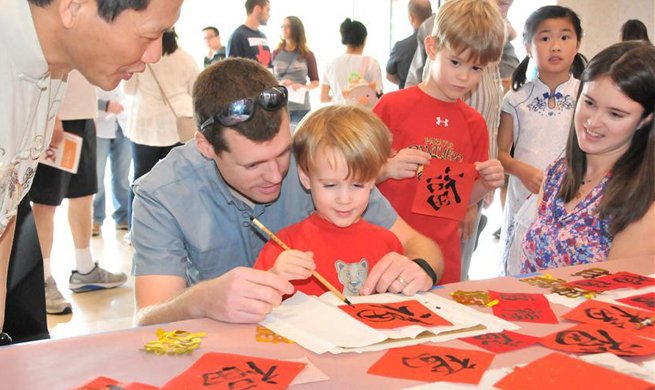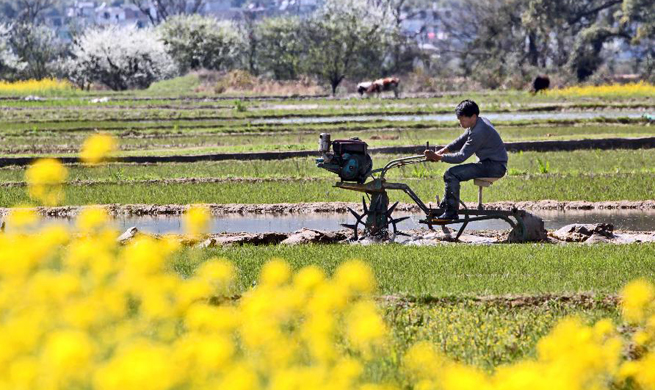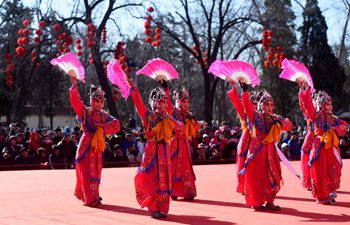LHASA, Feb. 19 (Xinhua) -- Holding a baby goat, or kid, tightly in her arms, Tse Drolma must walk more than one hour to Yamdrok Lake in the freezing weather. Sometimes she is lucky to get a free ride.
Tse Drolma lives in impoverished Kamba Village, Konggar County in Tibet Autonomous Region.
The 17-year-old Tibetan girl is a student at a vocational school in Lhasa. She goes to the viewing platform beside Yamdrok Lake every day during her winter vacation, with her kid.
Four years ago, Tse Drolma's father fell seriously ill, leaving her mother to support the family.
"I just wanted to share the burden on my mother's shoulders," she said. She followed the lead of other villagers, who took goats to the lakeside and let tourists take photos with the animals for a small charge.
Goats have become "cash cows" for her family.
Tse Drolma earned just five yuan (0.8 U.S. dollars) per customer when she first started. She never expected the animals to make a fortune, just some extra money to help her family.
During holidays, she goes to the observation platform, located nearly 5,000 meters above sea level, every morning at 9 a.m.
Tse Drolma makes sure her kids are well fed and prepares some hay for them before they leave home.
She often takes her textbooks and reads them at the platform, or listens to music when there are not many tourists. A pack of instant noodles is her normal lunch. She stays there until evening, enduring the strong winter winds.
Fortunately, the standard price for a goat photo doubled last year as the region has seen an increasing number of tourists. But Tse Drolma sometimes only has one or two customers, because she's too shy to solicit business.
During summer vacation, when the weather in the region becomes more pleasant, she said she can earn more than 100 yuan per day.
"Her name is Drolkar. She's only three months old," she said. Drolkar is the seventh kid Tse Drolma has worked with over the past few years.
She has to bring kids, as full-grown goats are not as cute and are not willing to let tourists touch them. Tse Drolma sets all her workmates free after they were grow bigger, rather than keeping them for their milk or slaughtering them for meat.
Tibet received more than 25 million visitors last year, an increase of 10.6 percent from 2016. Tourism revenue in 2017 increased 14.7 percent to 38 billion yuan (6 billion U.S. dollars).
Tourism has become a pillar industry in the region, which will be further developed in the coming years, so as to increase rural incomes and eventually lift all residents out of poverty, according to the first session of the 11th People's Congress of Tibet in January.
It is foreseeable that Tse Drolma's "goat photo business" will be prosperous in the near future.
Besides benefiting from the boom in tourism in the region, Tse Drolma and her family also receive support from the local government.
Her family is among millions of poor across the country expected to be lifted out of poverty by 2020 in the nationwide battle against poverty.
Last year, Tse Drolma's family received a 12,000-yuan subsidy, 3,000 yuan for each family member. Her father, who has taken part in a government-led poverty relief project and has now become a road maintenance worker, can earn more than 5,000 yuan per year.
The average disposable income of a resident in rural areas of Tibet was 10,330 yuan in 2017, with an increase of 13.6 percent from the previous year.
The number of impoverished people in the region reduced to 330,000 in 2017 from 590,000 in 2015. However, there are still 2,440 poor villages in Tibet, with Tse Drolma's village among them.
According to a report released by the regional government, Tibet will increase the average disposable income of rural residents to 11,670 yuan through promoting the development countryside of the tourism, eco-agriculture, and handicraft industries.
"Life is getting better than before," said Tse Drolma, but she said she doesn't want to completely rely on government assistance.
"I should do something on my own for my family. I dream of finding a good job after graduation and creating a better future for my family," she said.
With the help of government, as well as her diligence, the distance between Tse Drolma and her dream is no longer so big.
"I'm confident about a beautiful life in the future," she said.





